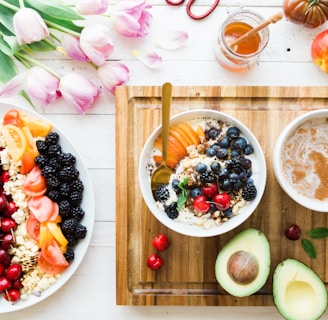Prenatal Nutrition: Essential Guide for a Healthy Pregnancy
Nutrition plays a crucial role in supporting both the mother and the developing baby during pregnancy. Eating a balanced diet ensures that both receive the necessary nutrients for optimal growth and development. Here’s a comprehensive guide to prenatal nutrition to help you make the best dietary choices during pregnancy. 1. Essential Nutrients for Pregnancy During pregnancy, your body requires additional nutrients to support fetal development. Key nutrients include: Folic Acid – Helps prevent neural tube defects; found in leafy greens, citrus fruits, and fortified cereals. Iron – Supports increased blood volume and oxygen transport; sources include red meat, lentils, and spinach. Calcium – Essential for developing strong bones and teeth; found in dairy products, almonds, and tofu. Protein – Supports the baby’s growth; sources include eggs, beans, fish, and lean meats. Omega-3 Fatty Acids – Important for brain and eye development; found in salmon, walnuts, and flaxseeds. 2. Foods to Include in Your Diet A well-balanced prenatal diet should consist of: Fruits and Vegetables: Rich in vitamins, minerals, and fiber. Whole Grains: Provide sustained energy and essential nutrients. Dairy Products: Ensure adequate calcium intake. Lean Proteins: Support the baby’s growth and development. Healthy Fats: Essential for brain development and hormone production. 3. Foods to Avoid During Pregnancy Some foods can pose risks to the baby’s health and should be avoided, including: Raw or Undercooked Meats and Seafood – Risk of bacterial infections. Unpasteurized Dairy Products – Can carry harmful bacteria. High-Mercury Fish – Such as swordfish and king mackerel, which can harm fetal development. Caffeine and Alcohol – Can negatively affect the baby’s growth. Excessive Sugar and Processed Foods – May contribute to gestational diabetes and unhealthy weight gain. 4. Managing Pregnancy Cravings Cravings are common during pregnancy. While it’s okay to indulge occasionally, aim for healthier alternatives, such as: Choosing dark chocolate over sugary sweets. Opting for homemade smoothies instead of sugary sodas. Eating baked sweet potatoes instead of fried snacks. 5. Hydration During Pregnancy Staying hydrated is essential for circulation, amniotic fluid balance, and digestion. Aim to drink at least 8-10 glasses of water daily and include hydrating foods like cucumbers, oranges, and watermelon in your diet. 6. Prenatal Supplements While a healthy diet is the foundation, prenatal vitamins help fill any nutritional gaps. Consult your healthcare provider for recommendations on prenatal supplements, especially those containing folic acid, iron, and DHA. Conclusion A well-balanced diet during pregnancy is key to ensuring the health and well-being of both mother and baby. By focusing on nutrient-rich foods, staying hydrated, and avoiding harmful substances, you can support a healthy pregnancy journey. Always consult your healthcare provider for personalized dietary guidance. Do you have any favorite pregnancy-friendly recipes? Share them in the comments below! 1. Missed Period A missed period is often the first noticeable sign of pregnancy. If your menstrual cycle is regular and you suddenly miss a period, it might be time to take a pregnancy test. 2. Nausea and Morning Sickness Many women experience nausea, commonly referred to as morning sickness, which can occur at any time of the day. This usually starts around the sixth week of pregnancy and can last for the first trimester. 3. Fatigue Feeling unusually tired? Increased progesterone levels in early pregnancy can cause extreme fatigue, making you feel more exhausted than usual. 4. Breast Changes Hormonal changes may cause breasts to become tender, swollen, or sore. You may also notice that your nipples darken and become more sensitive. 5. Frequent Urination If you find yourself making more trips to the bathroom, it could be an early sign of pregnancy. Increased blood flow to the kidneys and hormonal changes contribute to this symptom. 6. Food Cravings and Aversions Sudden cravings for certain foods, or an aversion to others, are common in early pregnancy. Strong scents and certain flavors may trigger nausea or discomfort. 7. Mood Swings Pregnancy hormones can significantly impact your emotions, making you feel more sensitive, emotional, or even irritable at times. 8. Light Spotting and Cramps Some women experience light spotting or implantation bleeding when the fertilized egg attaches to the uterus. This is usually lighter than a period and lasts only a day or two. 9. Bloating Hormonal changes can lead to bloating, similar to what happens before a period, making your abdomen feel fuller or tighter than usual. 10. Increased Basal Body Temperature If you’ve been tracking your basal body temperature, a sustained rise for more than two weeks could be a sign that you’re pregnant. When to Take a Pregnancy Test If you’re experiencing several of these symptoms, taking a home pregnancy test can provide clarity. For the most accurate results, it’s best to test in the morning after a missed period. If the test is positive, schedule an appointment with your healthcare provider to confirm the pregnancy and begin prenatal care. Conclusion Every woman’s body reacts differently to pregnancy, and symptoms can vary. If you suspect you might be pregnant, paying attention to these early signs can help you determine the next steps. Whether planned or unexpected, early detection allows you to seek proper care and guidance for a healthy pregnancy journey. Have you experienced any of these signs? Share your thoughts and experiences in the comments below!
1. MISSED PERIOD
2/8/20251 min read


